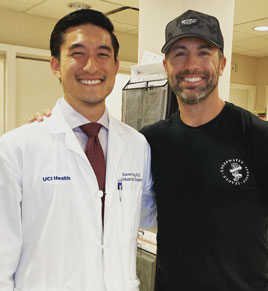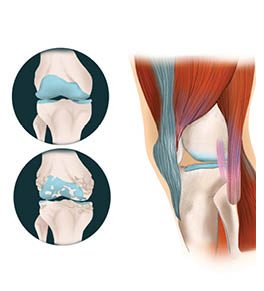
Hip Fracture
The orthopaedic specialists at UCI Health help patients recover from a hip fracture through surgery while working with them to prevent future fractures by treating the underlying causes and dangers.
If you have osteoporosis, are prone to falls,or have experienced an accident or sudden injury a hip fracture poses a serious threat to your health mobility and overall quality of life.
Along with pain and reduced mobility, a hip fracture can lead to serious complications, including:
- Blood clots
- Pneumonia
- Muscle atrophy (wasting of muscle tissue)
- Postoperative infections
- Cognitive decline after surgery, particularly in older patients
- Avascular necrosis (bone tissue death due to disrupted blood supply)
Our orthopaedic specialists are committed to helping you recover from a hip fracture and preventing future injuries. They will provide an accurate diagnosis, address your concerns, and offer the most advanced surgical techniques along with a comprehensive recovery plan tailored to your needs.
Types and Symptoms of Hip Fracture
A fracture can be partial or complete, and a bone may have a single break or multiple breaks. The most common types of hip fractures include:
- Femoral neck fractures: Breaks that occur in the neck of the thigh bone, near the hip joint
- Intertrochanteric hip fractures: Breaks further down the thigh bone, between the bony projections
- Stress fractures: Tiny cracks in the bone, often caused by overuse or repetitive stress
- Symptoms of a hip fracture may include:
- Hip pain or pain that radiates to the knee
- Low back pain
- Difficulty standing or walking
- Bruising or swelling around the hip
- A foot turned outward, making the leg appear shorter
If you experience any of these symptoms, contact your doctor as soon as possible to discuss your concerns and determine the next steps.

Recover from Hip Fracture now
Get on the road to recovery today.
Schedule an appointment by calling 714-456-7012 or

Find an orthopaedics clinical trial
Talk to your doctor to see if a orthopaedics clinical trial is right for you.
Featured Blog Posts

Live Well’s most popular stories of 2023
Take a peek at our readers' favorite articles of the year.

Partial knee replacement revitalizes life of Marine

A novel approach to treating knee arthritis
A first-in-human clinical trial shows promise as a nonsurgical way to keep aging knees strong and pain-free.
Causes and risk factors of hip fracture
For older adults, falls are the most common cause of hip fractures, but trauma from other injuries can lead to a fracture at any age.
Other factors that may increase your risk of a hip fracture include:
- Osteoporosis (a condition that weakens bones)
- Excessive alcohol or caffeine consumption
- A sedentary lifestyle (lack of regular physical activity)
- Low body weight or tall stature
- Vision problems
- Dementia
- Medications that cause bone loss
- Smoking
- Living in assisted-care facilities
- Health conditions that cause weakness, balance problems, or difficulty walking
If you are concerned about your risk, speak with your doctor to discuss preventative measures, such as lifestyle changes, improving balance, or addressing underlying health conditions.
Diagnosing hip fracture
The first step towards hip fracture recovery is getting a proper diagnosis. When you schedule an appointment with the orthopedic specialists at UCI Health, they will conduct a complete medical history and physical examination.Diagnostic procedures for hip fracture may include X-ray, MRI, or a computed tomography (CT) scan.
Treatment and Prevention for Hip Fracture
The treatment for a hip fracture depends on several factors, including:
- Your age, overall health, and medical history
- The severity of the fracture
- Your ability to tolerate specific medications, procedures, or therapies
- Expected recovery outcomes
- Your personal preferences
Surgery is the most common treatment for hip fractures. Depending on the fracture’s severity, your doctor may use metal implants to strengthen and stabilize the joint. In more severe cases, a total hip replacement may be necessary, which involves replacing the damaged joint with an artificial one.
Our primary goal is to relieve your pain and help you return to your normal activities. Hip surgery typically involves an in-hospital stay, followed by both inpatient and outpatient physical therapy to restore mobility and strength.
Prevention
Preventing hip fractures is always preferable to treating them. Consider the following steps to reduce your risk:
Nutrition and Bone Health:
- Consume enough calcium through foods like milk, yogurt, sardines, and broccoli.
- Postmenopausal women may consider estrogen therapy (consult your doctor).
- Take medications as prescribed to prevent bone loss.
- Eat a balanced diet to support bone health.
Exercise and Strength:
- Engage in weight-bearing exercises, such as walking, jogging, or hiking.
- Incorporate mobility and balance exercises like Tai Chi to improve strength and stability.
- Lifestyle Adjustments:
- Stop smoking to improve bone density.
- Limit excessive alcohol use, which can weaken bones and impair balance.
Home Safety:
- Remove tripping hazards, such as electrical cords or loose rugs.
- Use slip-resistant rugs and pads to secure flooring.
- Install grab bars in bathrooms and position night lights to improve visibility.
- Avoid standing on unsteady furniture.
Vision Care:
- Schedule annual eye exams with an ophthalmologist to detect and treat vision problems.




